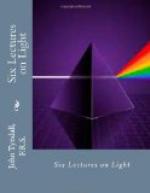Introductory
uses of experiment
early scientific notions
sciences of observation
knowledge of the ancients regarding light
defects of the eye
our instruments
rectilineal propagation of light
law of incidence and reflection
sterility of the middle ages
refraction
discovery of Snell
partial and total reflection
velocity of light
Roemer, Bradley, Foucault, and Fizeau
principle of least action
Descartes and the rainbow
Newton’s experiments on the composition
of solar light
his mistake as regards achromatism
synthesis of white light
yellow and blue lights produce white by
their mixture
colours of natural bodies
absorption
mixture of pigments contrasted with mixture
of lights.
Sec. 1. Introduction.
Some twelve years ago I published, in England, a little book entitled the ‘Glaciers of the Alps,’ and, a couple of years subsequently, a second book, entitled ‘Heat a Mode of Motion.’ These volumes were followed by others, written with equal plainness, and with a similar aim, that aim being to develop and deepen sympathy between science and the world outside of science. I agreed with thoughtful men[1] who deemed it good for neither world to be isolated from the other, or unsympathetic towards the other, and, to lessen this isolation, at least in one department of science, I swerved, for a time, from those original researches which have been the real pursuit and pleasure of my life.
The works here referred to were, for the most part, republished by the Messrs. Appleton of New York,[2] under the auspices of a man who is untiring in his efforts to diffuse sound scientific knowledge among the people of the United States; whose energy, ability, and single-mindedness, in the prosecution of an arduous task, have won for him the sympathy and support of many of us in ‘the old country.’ I allude to Professor Youmans. Quite as rapidly as in England, the aim of these works was understood and appreciated in the United States, and they brought me from this side of the Atlantic innumerable evidences of good-will. Year after year invitations reached me[3] to visit America, and last year (1871) I was honoured with a request so cordial, signed by five-and-twenty names, so distinguished in science, in literature, and in administrative position, that I at once resolved to respond to it by braving not only the disquieting oscillations of the Atlantic, but the far more disquieting ordeal of appearing in person before the people of the United States.




